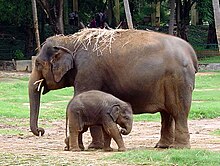นาค
Hello, you have come here looking for the meaning of the word นาค. In DICTIOUS you will not only get to know all the dictionary meanings for the word นาค, but we will also tell you about its etymology, its characteristics and you will know how to say นาค in singular and plural. Everything you need to know about the word นาค you have here. The definition of the word นาค will help you to be more precise and correct when speaking or writing your texts. Knowing the definition ofนาค, as well as those of other words, enriches your vocabulary and provides you with more and better linguistic resources.

child postulants 
Naga tribeswomen 
beautyleaf 
mother elephant and her child 
a multi-headed nāga flares its hood 
Chinese dragon figurine
Pali
Alternative forms
Alternative scripts
Noun
นาค m
- Thai script form of nāga
Declension
Declension table of "นาค" (masculine)
| Case \ Number | Singular | Plural |
|---|---|---|
| Nominative (first) | นาโค (nāgo) | นาคา (nāgā) |
| Accusative (second) | นาคํ (nāgaṃ) | นาเค (nāge) |
| Instrumental (third) | นาเคน (nāgena) | นาเคหิ (nāgehi) or นาเคภิ (nāgebhi) |
| Dative (fourth) | นาคสฺส (nāgassa) or นาคาย (nāgāya) or นาคตฺถํ (nāgatthaṃ) | นาคานํ (nāgānaṃ) |
| Ablative (fifth) | นาคสฺมา (nāgasmā) or นาคมฺหา (nāgamhā) or นาคา (nāgā) | นาเคหิ (nāgehi) or นาเคภิ (nāgebhi) |
| Genitive (sixth) | นาคสฺส (nāgassa) | นาคานํ (nāgānaṃ) |
| Locative (seventh) | นาคสฺมิํ (nāgasmiṃ) or นาคมฺหิ (nāgamhi) or นาเค (nāge) | นาเคสุ (nāgesu) |
| Vocative (calling) | นาค (nāga) | นาคา (nāgā) |
Thai






Pronunciation
| Orthographic | นาค n ā g | ||
| Phonemic | นาก n ā k | นาก-คะ- n ā k – g a – | |
| Romanization | Paiboon | nâak | nâak-ká- |
| Royal Institute | nak | nak-kha- | |
| (standard) IPA(key) | /naːk̚˥˩/(R) | /naːk̚˥˩.kʰa˦˥./ | |
| Homophones | นาก | ||
Etymology 1
From Pali nāga (“noble person”). Cognate with Modern Khmer នាគ (niək).
Noun
นาค • (nâak)
Derived terms
Etymology 2
Probably from Sanskrit नाग (nāga, “cruel man”).
Proper noun
นาค • (nâak)
- Naga: tribesman living near the Naga Hills.
Etymology 3
From Pali nāga (“ironwood tree”).
Noun
นาค • (nâak)
- (botany) beautyleaf, the plant Calophyllum inophyllum L. of the family Clusiaceae (syn. Guttiferae).
Synonyms
beautyleaf
Etymology 4
From Pali nāga (“elephant”). Compare Sanskrit नाग (nāga, “elephant”). Cognate with Modern Khmer នាគ (niək); Burmese နာဂ (naga.).
Noun
นาค • (nâak)
Synonyms
- (elephant) See ช้าง (cháang).
Derived terms
Etymology 5
From Pali nāga (“cobra”). Compare Sanskrit नाग (nāga, “cobra”). Cognate with Old Khmer nāga, nāgya, nāgā; Modern Khmer នាគ (niək); Burmese နဂါး (na.ga:), နာဂ (naga.); Lao ນາກ (nāk); Mon နာ်.
Noun
นาค • (nâak)
- (mythology) (พญา~, พระยา~) naga; dragon.
- Revelation 12:7, KJV:
- และมีสงครามเกิดขึ้นในสวรรค์ มีคาเอลและพวกทูตสวรรค์ของท่านได้ต่อสู้กับพญานาค และพญานาคกับพวกทูตของมันก็ต่อสู้
- lɛ́ mii sǒng-kraam gə̀ət kʉ̂n nai sà-wǎn mii-kaa-eel lɛ́ pûuak tûut-sà-wǎn kɔ̌ɔng tân dâai dtɔ̀ɔ-sûu gàp pá-yaa-nâak lɛ́ pá-yaa-nâak gàp pûuak tûut kɔ̌ɔng man gɔ̂ɔ dtɔ̀ɔ-sûu
- And there was war in heaven, Michael and his angels waging war with the dragon. The dragon and his angels waged war,
- Revelation 13:11, KJV:
- และข้าพเจ้าเห็นสัตว์ร้ายอีกตัวหนึ่งขึ้นมาจากแผ่นดิน มีสองเขาเหมือนลูกแกะ และพูดเหมือนพญานาค
- lɛ́ kâa-pá-jâao hěn sàt-ráai ìik dtuua nʉ̀ng kʉ̂n maa jàak pɛ̀n-din mii sɔ̌ɔng kǎo mʉ̌ʉan lûuk-gɛ̀ lɛ́ pûut mʉ̌ʉan pá-yaa-nâak
- And I beheld another beast coming up out of the earth; and he had two horns like a lamb, and he spake as a dragon.
- Job 26:13, KJV:
- Revelation 12:7, KJV:
- (chiefly poetic) snake.
Synonyms
- nāga; dragon
- งูใหญ่
- เงือก (ngʉ̂ʉak)
- เงือกหงอน
- จอมนาค
- นาคา
- นาคินทร์
- นาคี (naa-kii)
- นาเคนทร์
- นาเคศ (naa-kêet)
- นาเคศวร
- นาโครคินทระ
- ผณินทร
- ผณิศวร (pà-ní-sǔuan)
- พญางู
- พาสุกรี (paa-sù-grii)
- ภุชคะ
- ภุชงค์ (pú-chong)
- ภุชงคมะ
- โภคิน
- โภคี
- มกร (má-gɔɔn)
- มะโรง (má-roong)
- มังกร (mang-gɔɔn)
- วาสุกรี (waa-sù-grii)
- วาสุกี (waa-sù-gii)
- อุรคะ (ù-rá-ká)
- อุรเคนทร์
- (snake) See งู (nguu).